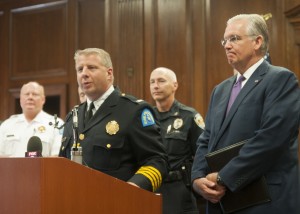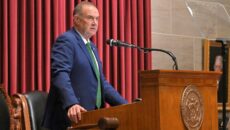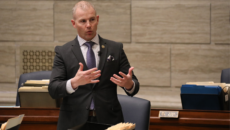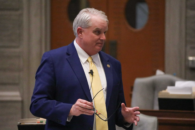ST. LOUIS — Gov. Jay Nixon continued his summer travel session with trips to St. Louis and Kansas City Wednesday to discuss his House Bill 301 veto that deals with changes in the sex offender registry.
During his St. Louis visit, Nixon most notably spoke out against House Speaker Tim Jones’ comments about HB 301 being “right for override.” He added this bill is not a matter of politics but of public safety.

“As governor of the state of Missouri, you are turning down what a branch of government has done. We take that very seriously,” Nixon said during the event. “I would think after reading that well-reasoned veto message on an issue such as this, that this would have transcended the light political talk of the day in terms such as, ‘right to override.’ As this is some sort of contest, as if somebody’s keeping a scoreboard about the public work that we do.”
St. Louis City Police Chief Sam Dotson and County Police Chief Tim Fitch were among the police officers that attended to show support for the governor’s stance that HB 301 would ultimately weaken rules regarding sex offenders.
The bill states a sex offender who committed an offense when he or she was younger than 18 can repeal information of his or her offense on the Missouri State Highway Patrol website. An offender, the bill states, can have this petition five years after the offense and the “court must grant the petition and enter an order directing the removal of the offender’s name and information from the registry.”
If this bill is put into effect, Nixon said as many as 870 sex offenders could be removed from the registry.
“Think about that,” Nixon said in his speech. “Eight hundred and seventy sex offenders including criminals who have been convicted of crimes like forcible rape, forcible sodomy and child molestation will be removed from these websites in one fowl swoop.”
Maggie Crane, spokesman for St. Louis Mayor Francis Slay, said Slay shares the concerns of the governor of offenders being removed from the registry.
“(The mayor) is more interested in the rights of victims and innocent people,” Crane said.

Rep. Kevin Engler, R-Farmington, the bill’s sponsor, said HB 301 does require a petition before there is a name removal, which would help ensure dangerous criminals’ information remained on the site.
Engler said after five years on the registry, sex offenders are not instantly removed.
In 1994, the statewide sex offender registration program was established and has received “broad, consistent and bipartisan support ever since,” Nixon added.
Nixon touted the registry program as being a vital tool for parents and communities.
“Parents can check who lives down the block from the house they’re looking to buy or the babysitter their looking to hire or the new volunteer with the local youth organization,” he said.
The sex offender websites — run by the Missouri State Highway Patrol and individual police departments — are tools that have been highly utilized by the public, Nixon said. Within the past year, he said the Missouri State Highway Patrol’s site has received 4.2 million hits.
“This stuff works, okay?” Nixon said. “We really thought about how to do these things. All of us in law enforcement know that having the public on our side and working with us is so important, and if we can give them information directly that they can access directly about dangerous folks, potentially dangerous folks, that helps us all.”
Engler said when people look at the sex offender registry they have “reason to be fearful.” But, he said, not all of those listed as sex offenders need to be feared. He used the example of a 17-year-old having consensual sex with a 14-year-old partner. The parents of the 14-year-old press charges and the 17-year-old is now a sex offender. Urinating in public was another sex offender reference Engler used as an example.
“It’s like ‘crying wolf’ when you put some people on that list because they don’t present a danger and it puts them in a position where it’s not good for them,” Engler said.
Engler said legislators and Nixon should have worked together on this issue in April and May, but that “it’s past that point.”
House Speaker Tim Jones hasn’t indicated specifically which bills will be brought up during veto session, but said that any during caucus that received a solid amount of support — close to 109 votes — will be brought up.









